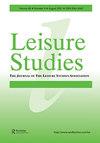The influence of leisure patterns on the subjective well-being of the floating population—A social integration perspective
IF 2.3
2区 社会学
Q2 HOSPITALITY, LEISURE, SPORT & TOURISM
引用次数: 0
Abstract
ABSTRACTThis paper uses microdata from the 2017 China Time Use Survey (CTUS) to study the impact of leisure patterns on the subjective well-being of the floating population. We find that latent profile analysis (LPA) divides the leisure time allocation patterns of the Chinese floating population into five types: self-entertainment type, family-friendly type, sports fitness type, social-entertainment type and cultural-artistic type. The empirical results show that the sports fitness type and the cultural-artistic leisure type are the most conducive to the improvement of the subjective well-being of the floating population, followed by the social-entertainment type and the family-friendly type, whereas the self-entertainment type does not contribute to the improvement of subjective well-being. The analysis of the mechanism of action shows that social integration is the mediating variable of the leisure patterns promoting the subjective well-being of the floating population. The conclusion has implications for urban managers to better help the floating population in China integrate into the new environment and improve their quality of life.KEYWORDS: Floating populationleisure patternssubjectivewell-beingsocial integrationChina AcknowledgementsAppreciate the anonymous reviewers for their valuable revision suggestions.Disclosure statementNo potential conflict of interest was reported by the author(s).Notes1. Regarding the fundamental role of the hukou system in socioeconomic segmentation in China, see Liu (Citation2005), Wang (Citation2004), and Wu and Treiman (Citation2007). Inspired by Jiang et al. (Citation2012), there are three population groups in urban areas due to the China’s Hukou Registration Policy. The first group is the rural migrant group without urban hukou status. The second group are ‘native’ urban residents who have urban hukou from birth. The third group are ‘new citizens’ who had changed their hukou status from rural to urban or from small city to big city status.2. Leisure time, hour/per day.3. The income happiness puzzle refers to the fact that as income levels increase, individual happiness does not increase (Easterlin, Citation1995).4. Due to space limitations, this paper only presents the results that have significance.Additional informationFundingThis paper is supported by research from the Henan Provincial University Science and Technology Innovation Team (23IRTSTHN017), General Project of Humanities and Social Sciences in Higher Education Institutions of Henan Province (2024-ZZJH-162) , the General Program of the National Natural Science Foundation of China (42071198),the General Program of the National Social Science Foundation of China (23BGL174), the 2023 Henan Province Soft Science Research Project (232400410361), the 2023 Central Plains Talent - Central Plains Cultural Youth Talent Program and the 2023 Luoyang Normal University Youth Key Teacher Training Program.Notes on contributorsPengfei WangDr. Pengfei Wang (PhD) is an associate professor at the School of Land and Tourism of Luoyang Normal University. His main research areas include tourism economics, leisure economics, and leisure time allocation.Xiaodan CaoXiaodan Cao (MD) is a lecturer at the School of Land and Tourism of Luoyang Normal University, and her main research area is smart tourism.Zhaoyu GaoDr. Zhaoyu Gao (PhD) is a lecturer at the School of Government, University of International Business and Economics, and her main research areas include sports tourism and Olympic tourism.Xiaoyan SuDr. Xiaoyan Su (PhD) is a professor at Luoyang Normal University, specializing in the protection and utilization of cultural heritage.Xiang WeiDr. Xiang Wei (PhD) is a professor at the University of the Chinese Academy of Social Sciences, specializing in the fields of leisure economy and tourism economy.流动人口休闲方式对主观幸福感的影响——基于社会整合视角
摘要本文利用2017年中国时间利用调查(CTUS)的微观数据,研究流动人口休闲方式对主观幸福感的影响。研究发现,中国流动人口的休闲时间分配模式可分为自我娱乐型、家庭友好型、体育健身型、社会娱乐型和文化艺术型五种类型。实证结果表明,运动健身类型和文化艺术休闲类型最有利于提高流动人口主观幸福感,其次是社交娱乐类型和家庭友好类型,而自我娱乐类型对主观幸福感的提高没有贡献。作用机制分析表明,社会整合是流动人口休闲模式提升主观幸福感的中介变量。研究结论对城市管理者更好地帮助中国流动人口融入新环境,提高其生活质量具有一定的启示意义。关键词:流动人口;休闲模式;主观幸福感;披露声明作者未报告潜在的利益冲突。关于户口制度在中国社会经济分割中的基础性作用,参见Liu (Citation2005)、Wang (Citation2004)和Wu and Treiman (Citation2007)。受Jiang等人(Citation2012)的启发,由于中国的户籍政策,城市地区有三个人口群体。第一类是没有城市户口的农民工群体。第二类是“本地”城市居民,他们从出生起就拥有城市户口。第三类是“新市民”,他们的户口由农村变为城市,或由小城市变为大城市。休闲时间,每天一小时。收入幸福之谜指的是这样一个事实,即随着收入水平的增加,个人的幸福并没有增加(Easterlin, Citation1995)。由于篇幅所限,本文只给出有意义的结果。本文得到河南省高校科技创新团队(23IRTSTHN017)、河南省高等学校人文社会科学综合项目(2024-ZZJH-162)、国家自然科学基金面上项目(42071198)、国家社会科学基金面上项目(23BGL174)的支持。“2023河南省软科学研究项目”(232400410361)、“2023中原人才-中原文化青年人才计划”、“2023洛阳师范大学青年骨干教师培养计划”。作者注:王鹏飞。王鹏飞,博士,洛阳师范大学国土与旅游学院副教授。主要研究领域为旅游经济学、休闲经济学、休闲时间分配。曹晓丹(MD),洛阳师范学院国土与旅游学院讲师,主要研究方向为智慧旅游。Zhaoyu GaoDr。高兆宇(博士),对外经济贸易大学政府管理学院讲师,主要研究方向为体育旅游、奥运旅游。晓燕SuDr。苏晓燕(博士),洛阳师范学院教授,主要研究方向为文化遗产保护与利用。湘WeiDr。向伟(博士),中国社会科学院大学教授,主要从事休闲经济、旅游经济研究。
本文章由计算机程序翻译,如有差异,请以英文原文为准。
求助全文
约1分钟内获得全文
求助全文
来源期刊

Leisure Studies
HOSPITALITY, LEISURE, SPORT & TOURISM-
CiteScore
4.90
自引率
14.30%
发文量
85
期刊介绍:
Leisure Studies publishes articles of a high standard on all aspects of leisure studies and from a variety of disciplinary bases, including sociology, psychology, human geography, planning, economics, etc. Shorter research notes and book reviews are also published. The emphasis of the Journal is on the social sciences, broadly defined, and the subjects covered include the whole range of leisure behaviour in the arts, sports, cultural and informal activities, tourism, urban and rural recreation.
 求助内容:
求助内容: 应助结果提醒方式:
应助结果提醒方式:


